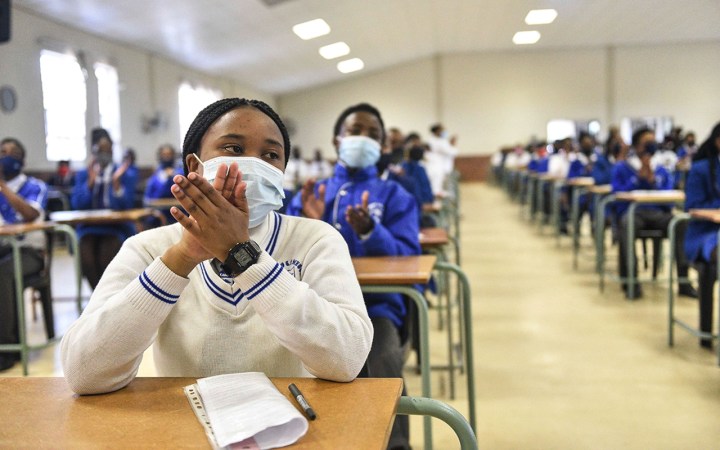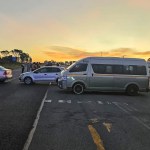NATIONAL SENIOR CERTIFICATE
Rolling blackouts a big worry as matrics set to write final examinations

It’s all systems go for 923,460 Grade 12 pupils across South Africa who will put pen to paper on Monday in the National Senior Certificate exams. However, rolling blackouts are a major concern.
Despite rolling blackouts being a long-standing issue, the Department of Basic Education (DBE) seems to have no long-term solution. Every year at matric exam time the department negotiates with Eskom on measures to curb the impact of rolling blackouts on teaching and learning, but that has not produced sustainable solutions as the measures only cater for a specific period until the next exam season.
In addition to the challenges that follow two years of battling the Covid-19 pandemic, the matric class of 2022 faces increased rolling blackouts which make it difficult to study and pose a threat to the upcoming exams.
In a briefing on Sunday, the minister of basic education, Angie Motshekga, signalled that both the regulatory body, Umalusi, and the Department of Basic Education were ready to administer the 2022 National Senior Certificate examinations.
Reflecting on the problem in a written response, Equal Education (EE) researcher Kimberley Khumalo told Daily Maverick: “For 15 years, load shedding has plagued South Africa, negatively impacting teaching and learning.
Basic requirement
“According to the Norms and Standards, access to electricity is one of the basic infrastructure requirements that contribute to making a school a conducive learning environment. However, the load-shedding crisis is a small part of the systemic issues brought about by the state failures … in multiple sectors over the years.
“On several occasions … the DBE, as well as entities like Eskom, has been found mismanaging funds, spending funds irregularly and failing to meet their constitutional obligations.
“According to the latest National Education Infrastructure Management System (NEIMS) report, 3,343 schools still do not have access to a reliable source of electricity … the DBE should do more to ensure that this does not affect learners that have already had significant learning losses.
“In June 2021, the DBE estimated that 75% of learning was lost in 2020, and Wave 5 of the Nids-Cram survey estimated that most primary school learners had lost between 70% and a full year of learning between March 2020 and June 2021, as a result of rotational timetabling. EE believes that having to continue learning and further writing exams in these conditions is unacceptable. Expecting these learners to also have to navigate load shedding to access education is absurd.”
Visit Daily Maverick’s home page for more news, analysis and investigations
The 2022 National Senior Certificate (NSC) examinations are scheduled to start on Monday, 31 October and end on 7 December (although there were a few exams this month and last month). The number of matric candidates this year has increased by 25,674.
Last month saw the written examination of Life Orientation, while practical exams in Visual Arts and Design, Performing Arts, Computer Applications Technology and Information Technology were held this month.
Concerns have been raised about the impact of rolling blackouts following disruptions in two practical exams last week, Computer Applications Technology and Information Technology.
Eskom says it is impossible to exempt schools or matric exam centres from rolling blackouts. Eskom’s spokesperson, Sikonathi Mantshantsha, said the Department of Basic Education and Eskom met on 14 October, when the department outlined its priority requirements for the exams.
Mantshantsha said that at the meeting Eskom committed to exploring all options to assist the class of 2022 by looking into the following areas:
- Possible solutions to make electricity supply available during the writing of the Computer Application Technology, Information Technology and South African Sign Language exams, which are electricity-dependent;
- Possible isolation of marking centres during marking; and
- Possible isolation of the mark capture centres and the centres where the processing of results will take place nationally and provincially.
Mantshantsha said Eskom explained that “the integrated nature of the examination centres on the power grid” made isolating all examination centres “impossible” and that “the above commitments cannot be guaranteed, given the instability of the power grid, which fluctuates daily”.
Commenting on this, Khumalo said: “Public outcry has led to 72 hospitals being exempt from load shedding as of 20 October 2022. Cabinet members whose homes are within the vicinity of the Union Buildings in Tshwane are also exempt from load shedding. The Union Buildings, as a national key point, are not able to be without electricity. Exempting key sectors from load shedding is not only possible but practicable. It is therefore alarming that Eskom has argued that it is unable to exempt schools from load shedding.”
Equal Education called on the DBE to ensure that Eskom understands that having electricity in schools is key to fulfilling learners’ immediately realisable constitutional right to basic education.
“The DBE must ensure that exams can continue without disturbance by exempting schools from load shedding,” said Khumalo.
What is the DBE’s plan to deal with rolling blackouts?
The DBE has put in place an opportunity for a rewrite of the Computer Applications Technology and Information Technology papers on 7 December to allow learners that faced disruption during these examinations a second opportunity to complete them.
DBE Director-General Mathanzima Mweli said that despite the best efforts of the department, “We are nonetheless aware of the negative impact of load shedding on the performance of learners writing this examination. Difficult as it is, the department has given guidelines on how to deal with this and appreciates the innovation and creativity employed by schools.
“The DBE continues to liaise closely with Eskom … and other relevant stakeholders to manage the risks posed by load shedding and other security-related matters. Provincial education departments have requested schools, where possible, to procure alternative lighting mechanisms for our examination centres and power generators.” DM


















Comments - Please login in order to comment.